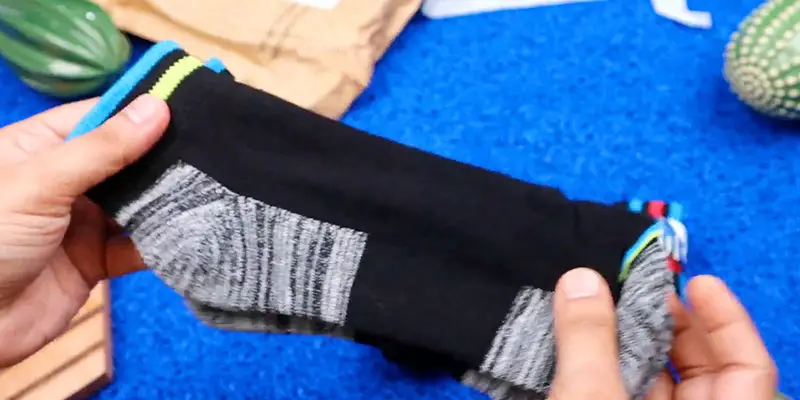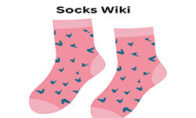Hi, I'm Christopher Bevans, the creator of SocksWiki.com. With a background in fashion design and a passion for innovation, I’m here to share my knowledge on socks from troubleshooting tips to detailed buying guides. I believe the right pair of socks can make all the difference, and through this site, I aim to help you find the perfect fit for every occasion.
Hi, I'm Christopher Bevans, the creator of SocksWiki.com. With a background in fashion design and a passion for innovation, I’m here to share my knowledge on socks from troubleshooting tips to detailed buying guides. I believe the right pair of socks can make all the difference, and through this site, I aim to help you find the perfect fit for every occasion.
Polyester socks have gained popularity for their durability, affordability, and ability to retain color and shape. However, for individuals dealing with sweaty feet, the effectiveness of polyester socks is more nuanced.
While they offer moisture-wicking properties and quick-drying benefits, which can help keep feet dry, they can also be less breathable than natural fibers and may retain odors.
Understanding the pros and cons of polyester socks can help determine if they are the right choice for managing foot sweat, ensuring comfort, and maintaining foot health.
Are Polyester Socks Good for Sweaty Feet?
Polyester socks have become increasingly popular due to their durability, affordability, and ability to retain color and shape.
However, when it comes to managing sweaty feet, the effectiveness of polyester socks can be a bit more complex.
Let’s dive into the pros and cons of polyester socks for those dealing with sweaty feet.
Pros of Polyester Socks for Sweaty Feet
- Moisture-Wicking Properties: Modern polyester socks often come with moisture-wicking technology.
This means they can draw moisture away from the skin, helping to keep your feet dry. This feature can be particularly beneficial for those with sweaty feet.
- Quick-Drying: Polyester dries faster than many natural fibers like cotton.
If your feet do get sweaty, polyester socks will dry out more quickly, reducing the likelihood of prolonged dampness, which can lead to discomfort and odor.
- Durability: Polyester is a tough, durable material. It can withstand frequent washing and wear without losing its shape or deteriorating. This makes polyester socks a long-lasting option.
- Breathability Enhancements: Many polyester socks are blended with other fibers such as spandex or mesh to enhance breathability.
This allows for better air circulation, which can help manage foot sweat.
Cons of Polyester Socks for Sweaty Feet
- Less Breathable Than Natural Fibers: On its own, polyester is less breathable than natural fibers like cotton or wool.
This means that without additional technology or blends, polyester socks may trap heat and moisture.
- Potential for Odor: While polyester can wick moisture away, it doesn’t inherently have odor-resistant properties.
Bacteria thrive in moist environments, which can lead to smelly feet if the socks are not designed with antimicrobial features.
- Comfort Level: Some people find polyester less comfortable than natural fibers. If the socks are not well-designed, they can feel slick or synthetic against the skin, which might not be ideal foreveryone, especially those with sensitive skin.
Additional Considerations for Polyester Socks
- Blends with Natural Fibers: To counteract the breathability and comfort issues, polyester is often blended with natural fibers like cotton or wool.
These blends aim to combine the moisture-wicking properties of polyester with the softness and breathability of natural fibers.
- Antimicrobial Treatments: Many modern polyester socks are treated with antimicrobial agents to combat bacteria growth and reduce odors.
These treatments can be particularly beneficial for individuals with sweaty feet.
- Cushioning and Support: Polyester socks can be designed with additional cushioning and arch support, which can enhance overall comfort and reduce the likelihood of blisters or foot pain during extended wear.
- Fit and Compression: Some polyester socks are designed with compression features to improve blood circulation and reduce swelling.
This can be advantageous for athletes or individuals who spend long hours on their feet.
Choosing the Right Polyester Socks

When selecting polyester socks for sweaty feet, consider the following factors to ensure you get the best performance and comfort:
Fabric Blends
Look for socks that blend polyester with breathable materials like cotton or wool. These blends can provide a balance of moisture management and comfort.
Ventilation
Opt for socks with mesh panels or other ventilated areas to enhance breathability. These designs can help keep your feet cooler and drier.
Antimicrobial Properties
Choose socks with antimicrobial treatments to minimize odor and bacteria growth. This feature is especially important for those with sweaty feet.
Proper Fit
Ensure the socks fit well without being too tight or too loose. Proper fit is crucial for comfort and preventing friction that can lead to blisters.
Conclusion
Polyester socks offer several benefits for managing sweaty feet, including moisture-wicking properties, quick-drying capabilities, and durability.
However, they also have some drawbacks, such as potential breathability issues and odor retention.
By choosing high-quality polyester blends, ensuring proper ventilation, and opting for socks with antimicrobial treatments, you can enjoy the advantages of polyester socks while minimizing their disadvantages.
Ultimately, the best choice depends on individual preferences and needs, so it’s important to try different options and find what works best for you.
Frequently Asked Questions
What is the Best Sock Material for Sweaty Feet?
The best sock material for sweaty feet typically includes moisture-wicking fibers like merino wool, bamboo, or synthetic blends such as polyester mixed with spandex or nylon.
Do Feet Sweat in Polyester Socks?
Yes, feet can sweat in polyester socks. However, modern polyester socks often incorporate moisture-wicking technology that helps to manage sweat by drawing it away from the skin and allowing it to evaporate more quickly, which can help keep feet drier compared to some other materials.
Are Polyester Socks Bad for You?
No, polyester socks are not inherently bad for you, but their suitability depends on individual needs and preferences.
Are Polyester Socks Good for Sweaty Feet Men’s?
Yes, polyester socks can be good for men with sweaty feet, especially when they incorporate moisture-wicking technology and are designed with ventilation features.
What is the Best Material for Breathable Socks?
The best materials for breathable socks are typically natural fibers like merino wool and cotton, as well as bamboo.
To Recap
Polyester socks are popular for their durability and moisture-wicking properties, making them a viable option for managing sweaty feet.
They dry quickly and can keep feet dry, reducing discomfort and odor. However, polyester is less breathable than natural fibers like cotton or wool and may retain odors if not properly maintained.
Blends with natural fibers and antimicrobial treatments can enhance their effectiveness.
For men with sweaty feet, polyester socks with added ventilation and moisture-wicking technology can be beneficial, though personal preferences for comfort and breathability should guide the choice.

Hi, I'm Christopher Bevans, the creator of SocksWiki.com. With a background in fashion design and a passion for innovation, I’m here to share my knowledge on socks from troubleshooting tips to detailed buying guides. I believe the right pair of socks can make all the difference, and through this site, I aim to help you find the perfect fit for every occasion.
- Latest Posts by Christopher Bevans
-
How to Get Rid of a Sock Tan Line Naturally & Quickly
- -
What Socks to Wear With Grey Suit and Brown Shoes
- -
What Socks to Wear With Dress Shoes in 2026?
- All Posts


